|
“Therefore, since we have been justified by faith, we have peace with God through our Lord Jesus Christ, through whom we have gained access [by faith] to this grace in which we stand, and we boast in hope of the glory of God. Not only that, but we even boast of our afflictions, knowing that affliction produces endurance, and endurance, proven character, and proven character, hope, and hope does not disappoint, because the love of God has been poured out into our hearts through the holy Spirit that has been given to us.”--Romans 5:1-5
Many of us are taught from a young age that Jesus loves us, stands with us, and listens to our prayers. This reality is easy to accept intellectually but hard to know in one’s heart. As one matures through adolescence and adulthood, troubles seem to build and anxieties can begin to overwhelm. Despite our faith and love in Christ, a deafening silence and perceived sense of loneliness can invade one’s spiritual life. This can occur in a myriad of situations, but I have noticed it is especially common when people experience some sort of transition in their life. By its very nature, dramatic change disrupts routines and occupies the mind with a million more questions than on more “typical” days. Being worried and focused on other aspects of life makes it harder to see and know Jesus in these day-to-day moments. In addition, world events like natural disasters or instances of social or political upheaval can push many members of the faithful into periods of doubt and questioning. The key to getting through these “gray” moments in our spiritual life is through perseverance in the face of doubt, questions, and anxiety. One must dive deep into the moments of grayness in order to come to a better realization of who Jesus is and what true love and faith looks like. Before I continue, however, I want to say that this perseverance is not a perfect problem solver. Instead, taking one step at a time in the spiritual life despite a gray cloud or pall that seems to be hovering over you can be the means to continuing your faith and deepening your relationship with Christ. It is not a quick fix that will make you feel better in a day or two. Rather, perseverance is a method of faith development that looks different for each person. The key to all of this is consistency. Many saints experienced periods of spiritual drought, doubting, and dark nights of the soul (a term coined by St. John of the Cross). Most famously, St. Mother Teresa of Calcutta experienced decades of “hunger for God,” and “the terrible feeling of being ‘unwanted’ by Him.” St. Teresa arguably saw some of the ugliest facets of human life and society, and any person who was ministering to the poorest of the poor would feel some form of burnout and depression. Many Christians today experience these same emotions in their own faith journeys, and instead of giving up and letting go, one must do the counter-intuitive action and cling to Christ more. Although I understand that this sounds cliché, bringing one’s raw questions, emotions, fears, and doubts to Jesus—whether at Mass, Adoration, or even in the car—can help one come to resolutions. Prayer is defined in the Catechism as “the raising of one's mind and heart to God,” and since our hearts are all unique, our prayers to Jesus in “grey” moments look different (CCC 2559). You must find a form of prayer that helps you draw as close to Christ as possible. This prayer can be Adoration with journaling, a Rosary with meditation, talking with friends or a spiritual mentor, or even venting to God aloud when you are home alone. The most crucial part of these moments is that you are praying and talking to God. Lastly, these hard times are normal in the spiritual life. Countless saints have experienced them, and thousands of Catholics are in the midst of them every day. When one enters into these dark nights, one must cling to Christ in the hope that comes from afflictions as St. Paul says in his Letter to the Romans. As St. John of the Cross also says, trust that “in the dark night of the soul, bright flows the river of God.”
0 Comments
“Remember the days past when, after you had been enlightened, you endure a great contest of suffering. At times you were publicly exposed to abuse and affliction, at other times you associated yourselves with those so treated. You even joined in the sufferings of those in prison and joyfully accepted the confiscation of your property, knowing that you had a better and lasting possession. Therefore, do not throw away your confidence, it will have great recompense. You need endurance to do the will of God and receive what he has promised. ‘For, after just a brief moment, he who is to come shall come, he shall not delay. But my just one shall live by faith, and if he draws back I take no pleasure in him.’ We are not among those who draw back and perish, but among those who have faith and will possess life.” -Hebrews 10:32-39 We are living in an extremely tumultuous time. For over a year, a virulent sickness has swept over the world and caused havoc with our health, our economies, and the very way we relate to one another. It has separated us from friends, co-workers, extended family, and our church community, to name a few. In battling its transmission, we have been forced into isolation—severely limiting gatherings, celebrations together, and even sharing hugs. We have been stretched beyond our normal mode of living and the equilibrium of our lives has been disturbed, with no end clearly in sight. On top of all this, we have experienced political and social unrest – polarized groups rising against one another, causing great division instead of building unity. For any individual, these circumstances could easily defeat us and have us succumb to despair. I think of the Marty Haugen song many of us sing every year during Advent: “For you, O Lord, my soul in stillness waits, truly my hope is in you.” It resounds in my mind and heart as we traverse through such unsettling circumstances. Amidst all the unknowns and unrest, I have witnessed a beautiful vision that overrides all the devastation of the circumstances we are in. I have seen people sacrifice to care for others and people coming together to celebrate the joy of life in trying situations. I have witnessed God living and walking among us through the selfless individuals choosing to stand tall in faith and do all things in love. As Christians we are taught “God is love.” We were created out of love, for love. We are part of God’s great creation and we belong to Him. He guides, instructs, and protects us always. What a magnificent testament to hope in! We pray in our Creed: “I look forward to the resurrection of the dead and the life of the world to come.” This is part of what we profess at Mass before we enter into the liturgy of the Eucharist – which is the source and summit of our faith. We receive the Body, Blood, Soul and Divinity of our Lord to nourish us in body and spirit. This profession of faith, this gift of communion, allows us to walk through all the adversities of life as joyful people who understand our hope lies not in this world but in heaven, forever. This living hope comes from being nurtured by the stories from Scripture, being taught prayers and devotions, receiving the sacraments of Reconciliation and Eucharist frequently, singing hymns of praise and thanksgiving, and practicing acts of kindness daily. What an ironclad defense we have against any evil that would afflict our body or soul! How beautiful it is that as Christians we can be united together in faith wherever we are. This is how I have remained steadfast in hope and overcome fear during these trials that continue to badger us. Surrounding myself with pictures of the Holy Family, the saints, the crucifix, listening to Christ-centered music, praying novenas and prayers, attending Mass often, and sitting in the quiet and listening for God to speak to me are all ways I actively participate in being a person of hope. Even more simply, just keeping my home clean and neat makes it a peaceful sanctuary where I can experience God’s presence. I have no control over the things of this world that loom large over me, but that is okay. As long as I adjust my spiritual armor and remain grounded in Christ, I have every reason to walk in hope, joyously, no matter the circumstances. My husband I adopted the habit of praying Saint Patrick’s Breastplate each morning before going out into the fray and it has born much good fruit in our lives. I offer it to you as another tool to assist you in the battle against evil. We are children of light, born of love and destined for heaven. We belong to Him. He made us a community and all around the world, individually and in groups, we profess our faith boldly, we share His message of love constantly, and we support one another in solidarity of His kingdom. It is our job to remain in Him and He will supply all the grace needed to walk tall in hope. As St. Teresa of Avila said: ‘God withholds Himself from no one who perseveres.’ For more resources to guide you through the COVID-19 pandemic, please click here. For more resources on prayer, please click here. Through the halfway point in the fall semester, most any college student could testify to the highs and lows of trying to learn in these trying times. From Internet issues, Zoom exams, and burnout, each class that goes smoothly is a little victory, but some days it is just so hard to focus on classes. My inner biochemistry major wishes that learning by osmosis was possible – a passive learning because our attention is drawn to so much distraction. On the other hand, even though it requires a little more active thought, I know there’ve been some highs so far this semester. Even with social distancing, I have made new friendships and renewed others. Since I serve as a Resident Assistant at my university, where we have just freshmen and RAs on campus, I have gotten to see freshmen build friendships, find their niche, and take on leadership positions in the campus community. Through my personal experience and seeing the freshmen on my campus, a word to describe the semester so far would be “perseverance.” For me, perseverance has been continuing along the path of learning despite the challenges and difficulties. I have worked to develop four actions into habits during this semester to help build perseverance:
Ultimately, I hope to continue building upon these four actions for the rest of the semester to help strengthen my perseverance and to experience more highs than lows from this abnormal time. To help motivate me to keep going day after day in classes, I wrote this quote above my desk: “Nothing great is ever achieved without much enduring” – St. Catherina of Siena For more resources to grow spiritually during the COVID-19 pandemic, please click here.
Shifts in routines have a way of forcing us to reevaluate the purpose of our lives. When shaken from complacency, we start to ask questions of greater value: how do I spend my time, and with whom? What brought me joy today? What’s the purpose of my life? Where do I find meaning? As we continue to press onward in the midst of this global pandemic, I find myself asking these questions again and again. After prayer and reflection, I’ve come to realize I’ve worn many “masks,” and it took wearing a physical one to reveal them to myself. Prior to COVID-19, my work, my independence, my family, my social life, my community, my outings—these things and others gave my life meaning. They were my security blankets that helped me feel secure and often distracted me from some of life’s greater questions. None of these things are bad in themselves. All are good and fundamentally human. But, where our humanity often fails is in how much importance we give these temporal things. Does our occupation or social status or friend count lull us into a false sense of security or complacency? Do they make us feel powerful, independent, successful? Do they, in and of themselves, give our lives meaning? When I felt stressed or bored or unhappy prior to COVID-19, I could get a change of scenery at a museum or coffee shop. I could go to a store and buy something small to make my house more beautiful. I could go on a date with my husband or spend time with a friend. Many of these things were taken for granted, but as they become harder to accomplish or require much more intentionality and legwork, I’ve had to become creative in self-care and honest about where I find meaning in my life. First of all, I’ve had to sit longer with my feelings and allow myself to deeply feel my emotions. At various points throughout the pandemic, I’ve felt sad, anxious, frustrated, or lonely. Recognizing these feelings as legitimate and naming them has enabled me to better process what I’m going through and revealed to me what’s most meaningful. Many distractions have quieted down and enabled me to reflect on my life and mission. Who am I when I am not bouncing around from one mom group to the next? Who am I when I cannot organize and host events or gatherings? Who am I when I can rarely go to a store or go to get groceries? I am many things: a wife, a mother, a daughter, a writer, a sister, a friend. But most importantly, I am a Christian—a beloved daughter of God. When so many good and beautiful things that I relied on for purpose are rendered skeletons, I’ve had to relearn to rest in this true identity. I’ve found that God is asking me to place the purpose and meaning of my life not in these temporal things, but in his hands alone. I am not worthy of his salvation because of my degrees, my writing, my work, my friends, my connections, or my home. I am worthy of his salvation because he made me. Because I am his. Because he looked at me and said, “It is good” (cf Gen 1:31). What is much harder than the initial shock of any given change is often not the change itself, but the continued life thereafter. I find it much more difficult to persevere. Pressing on in what can seem endless and mundane seems overwhelming. For many of us, getting out of bed may be the biggest achievement of the day. I have to take my life and my new reality day by day. And I’ve noticed how this correlates to the journey of sanctity. A moment of conversion or change is just the beginning—a sustained life of faith, lived and chosen in each moment of each day, is the stuff of saints. It is the quiet, hidden path—the one Mary lived so long and so well—one of seeming insignificance or ordinariness that ultimately can mean everything. This time of uncertainty, lived with charity and faith, can be our foundation for holiness. As human beings, we long to be fully known and loved. These are our greatest desires. But we walk along with invisible masks that obscure our dignity, often preferring wearing them than to being seen face to face. We try to justify God’s love, or earn it, or excuse it, or dismiss it. What I’m learning more deeply as a result of this pandemic is that I am loved in spite of all these things. I am loved regardless of who I know, how full my schedule is, what I own, how successful I am. As I stay home yet another day, sustaining the life of a small but beautiful family and cultivating a domestic church, I am reminded that this--this is worthy and sanctifying. My Mount Tabor can be my own home. And I can be transfigured. During this time of wearing a physical mask to keep ourselves and others safe, I invite you to reflect on the invisible masks that you may be hiding behind. Where do you find meaning? What makes you feel secure? Where do you turn in times of hardship or suffering? During this season, may you have the courage to allow yourself to meet Christ’s gaze face-to-face. If you enjoyed this post, we invite you to read “New Normal: Adapting to Life During COVID-19 and The Grace to Suffer Well: Persevering During COVID-19” I stumbled into entrepreneurship in 2016 after studying philosophy, theology, and anthropology for my undergraduate and graduate degrees. Ending up in the business world felt like a long and winding road filled with sleepless nights, much discernment, and many conversations. In the few years after graduating from college, like many early 20-year-olds, I felt untethered and unsure of my direction. What was my direction in life? What was my mission? How did the Lord want me to use my gifts and talents to serve him? At the time, I attempted to answer these questions by searching for women who had accomplished work in the same field that I was going into. I spent endless hours looking for women on LinkedIn in their 40s and 50s who had achieved a successful career while also being married and raising a family. My search was futile. Although I did find a couple of single Catholic female entrepreneurs to connect with, for years, I felt like I was “making it up as I went along”: trying to weld married and family life while scaling a business, hiring and firing employees, serving clients, and trying to keep God in the center of it all. Every vocation for women within the Church is beautiful and worthy, but being a Catholic entrepreneur in particular has been challenging. Although I have developed some great friendships with secular business women, I can’t connect with them fully about discerning business decisions with my spiritual director or praying a daily rosary for my employees. Within the Catholic sphere, I can’t completely relate to stay-at-home mothers or women who are working a 9-5. I desperately needed a mentor but could not find one who was willing to devote time and effort to my growth. Speaking to women’s particular vocation, Pope John Paul II in Mulieris Dignitatem spoke to every woman’s calling to love: “The moral and spiritual strength of a woman is joined to her awareness that God entrusts the human being to her in a special way. Of course, God entrusts every human being to each and every other human being. But this entrusting concerns women in a special way - precisely by reason of their femininity - and this in a particular way determines their vocation”. Here, Pope John Paul II illuminates women’s ability to “receive the other” because of the design of their femininity. Through their motherhood, spiritual and physical, women are capable of receiving, knowing, and loving others in a manner different to men. God entrusts humanity to women, knowing that she is uniquely made to care for those around her. This act of entrusting carries through to every aspect of our modern world, including the sphere of business. Just as a mother nurtures her family, every woman in business has the mission to nurture those in her care: her clients, her employees, her colleagues. In a special way, Catholic women entrepreneurs co-create with God to create something out of nothing. Every woman-owned-business begins as merely a dream placed on her heart. Her mission is to share with the world her services and products—glimpses of God’s own heart and a genius that only she can share. This is why mentorship is essential: so that women who are called to practice business can find and live out their own unique mission in this world. Women are called to cultivate the gifts and talents of others, to foster the dreams that only they can bring forth. A mentor provides guidance, critique, and reassurance as a young person matures. This is crucial to the formation of any woman, entrepreneur or not, but also fulfills the role of each Christian to evangelize the world. Without this relationship, one might not have the tools and resources to realize their full potential. By fostering the gifts and talents of others through mentorship, women are living out their feminine genius. My Co-Founder, Emma Moran, and I created Catholic Women in Business in 2018. CWIB is an online resource of Catholic women who are seeking to live a life of faith while striving for excellence in their careers. We hope that it’s a space for women to cultivate mentorship and connection. My dream is to initiate a movement where there is more mentorship available within the Church, for women and men. In encouraging these relationships, I believe we will be able to activate the missions of those within our communities, answer the Church’s call to a New Evangelization, and to bring forth the Gospel into our society. “Joy is prayer, joy is strength, joy is love, joy is a net of love by which you can catch souls.” -St. Mother Teresa of Calcutta Throughout history, mankind has endured plagues, wars, and all sorts of crises that threaten our existence and make the day to day seem unbearable. In these past several months, the world has experienced the global effects of the novel coronavirus pandemic. Our country is also facing ramped up civil unrest. However, as Christians we are called to persevere with joy. As James 1:2-4 exhorts us: “Count it all joy, my brothers, when you meet trials of various kinds, for you know that the testing of your faith produces perseverance and perseverance must complete its work so that you will become fully developed, complete, not deficient in any way.” We can look back over two millennia and witness the hope that has always been present in the darkest of circumstances. Over and over, God our merciful Father remains with us, equips us with strength, and encourages us to dwell with Him in order to endure all things with joy. Furthermore, we have many examples of holy men and women who have stood steadfast in faith through great trials as joyful ambassadors of God’s love and mercy. During these times, I have felt the pangs of doubt, discouragement, and fear. I am completely aware of my smallness and my vulnerability. I keenly recognize that I need help so that I can find peace amidst hardship and uncertainty, and I daily choose to pray for guidance and courage to walk in faith. I am grateful for parents who raised me in the Church, taught me the power of prayer, and nurtured me in an environment of faith. I am grateful for my parish family who stand together to build up the Body of Christ in our community. I am grateful for a stalwart husband who shows me daily how to immerse myself in the loving arms of Jesus by attending Mass, reading Scripture, praying devotions, and asking for the divine blanket of protection and provision that only comes from Him. I am grateful for my married children who witness their sacramental love to all by living their marriage covenant. I am grateful for children who share their gifts to fill our home with laughter, creativity, and beauty. I am grateful for grandchildren who are joyful and full of curiosity and excitement and so easily make me forget about the troubles of the world. I know that I am puny, weak, and small, but God made me for love and reminds me through all these people—and many more—that He is always with us, giving us what we need to gallantly march through the nitty gritty of life. This gives me cause for great joy! How we behave determines the success of our mission as ambassadors for Jesus. We are told in Scripture to remain in God and to use the gifts of the Holy Spirit to navigate the messiness of this life. We are commanded to love God, others, and ourselves no matter the circumstances. The fruit of living in love is a joyful countenance. When we practice surrendering our doubts and fears and choose to act in faith and love, peace is a direct outcome. When we live out of an attitude of peace, we are unbound and able to exhibit joy in all things. St. Teresa of Avila encourages us: “Let nothing disturb you, nothing frighten you, all things are passing, God never changes. Patient endurance attains to all things. Whoever possesses God is wanting in nothing; God alone suffices.” As Christians, we are called to be the living reflection of our Lord and Savior. As we traverse this particularly troubling time, we strive to be beacons of hope to those despairing, lost, and without a foundation of faith. We are all commissioned to share the love and mercy of God to all we come in contact with. It is not a suggestion, but a mandate from our baptism. No matter how inadequate we think we are, if we surrender to God’s will, He will supply all we need to make any situation bearable and even joyful. There may be uncertainty, strife, devastation and hardship around us, but the heart of Jesus, who is all love, is within the soul of each of us. We are called to make it manifest through our acts of kindness, gentleness, patience, forgiveness and service. Each of us, one individual at a time, has the power to bring peace and joy to others as we continue to navigate the day to day. Below are some practical tips for remaining steadfast in faith and witnesses of joy:
Together, each of us mere mortals can build an environment of joy—a joy which will make all the difference in our hurting world. It was my spiritual director who first introduced me to the phrase new normal which has since become quite common in the days of COVID-19. At the time I learned this phrase, my Dad was sick, the situation was changing by the day, and my spiritual director shared a piece of wisdom with me: clinging to the past with no regard to where we stand in the present, let alone where we will stand in the future, is of little good. This doesn’t mean that we can’t look back fondly on memories and experiences—we should—but sometimes it’s necessary to shift our gaze from what was normal to what is our new normal. Turn on the news and we’re bound to hear this phrase mentioned. The elimination of handshakes, added temperature screenings before flying or entering large venues, social distancing—these are all changes that are tossed around as potential aspects of our new normal. Inherent to the new normal is grieving the loss of what used to be normal. On a recent podcast, Brené Brown, a research professor and speaker, spoke with David Kessler, an author and expert on death and grief, about how we, as a world, are collectively grieving during COVID-19. Their first premise is that we must name our grief before we can take it on. As we look to a new normal, we will likely find ourselves grieving many of the simple acts we might have taken for granted. So many of these aspects of our new normal are so far into the future and so uncertain that it might not be fitting for us to focus on them for too long lest we begin to fear for something not even guaranteed for the future. That doesn’t mean that we are not still mourning the loss of our normal and experiencing a new normal every single day. I celebrated my best friend’s birthday last week by sitting 12 feet apart and talking from a distance without even being able to share a hug. For those who have loved ones in hospitals or nursing homes, the difficult and sometimes downright terrifying new normal is not being able to visit them, to comfort them, or to be comforted ourselves. Our new normal might include grieving not being able to go to the store because it’s closed or because we are considered high risk if we contract the virus. In one way or another, we are all facing a new normal, but we must fight the urge to compare whose new normal is worse or more challenging. The necessity to find a new normal isn’t new in itself. After 9/11, we were also forced into a new normal. The same occurred after World War I, World War II, the Spanish Flu, The French Revolution, and the Great Plague which all forced society to adopt a “new normal”. A new normal, however, doesn’t have to be a bad thing. The printing press, the steam engine, and the discovery of penicillin all created a new normal that we are thankful for. Of course, the greatest events which created a new normal were the life, death, and Resurrection of our Lord, Jesus Christ. Think of the Apostles, such as James and John, who were called from a fishing boat to follow Jesus. Their entire conception of normal changed forever in that instance. As our Lord hung from the Cross on Good Friday, the world (especially that of the disciples) faced a new normal. How dejected afterwards were the two on the Road to Emmaus with their new normal, one that seemed to go on without the man they had come to know as the Messiah? Then of course, Jesus rose on the third day; He had defeated sin and death, and an eternal new normal was ushered into the world. That is the new normal which we can turn to in every moment when our lives are forced into a new normal we may not have asked for. Jesus Christ, God made flesh, He who was and is and is to come, gave all of creation a new normal which rings eternal. Nothing that happens in our world can change what He did for us in His life, death, and Resurrection. We are faced with a constantly changing new normal and we have to name our grief and understand that some of what we once knew is no longer our normal. In doing so, may we always be rooted in Christ who stands above the chaos as the rock of our salvation.
When I made the shift to working from home almost a month ago, I was excited for a change of pace: sleeping in, a 30-second commute from my bed, working in pajamas all day, not packing a lunch. But when it came down to it, I became restless and had trouble settling down. Focusing on work was difficult. Being productive did not come easy, with my mind wandering for much of the workday. I had embraced the idea of a change of pace, but not the realities of what that change really meant.
Prayer, when I remembered to make time for it, was similarly difficult to settle into. It took me some time to realize what was happening, in part because I work in a secular field. Since I don’t spend my workdays in the Church sphere, I don’t have many explicit or subtle reminders that point my day toward God. Meetings don’t begin with a prayer. My daily tasks and conversations with colleagues don’t revolve around Church activities and ministry. I don’t interact with my pastor or bishop over the course of my day. And though I’ve made an effort over the years to weave prayer and reminders of God into my daily life, my routine has been disrupted. So, naturally, my prayer life has gone out the window. Another piece to mention is that I live alone. Normally, I have a number of social engagements in the evenings and on weekends, often with Catholic friends. Our interactions have a shared Catholic identity baked in and serve as additional reminders of faith. Now that I’ve been largely alone for a month, my days seem to blur together. It's become easy to turn in on my own thoughts and seek out distractions to numb the collective grief we’re all feeling: the loss of normalcy and a sense of security, cancelled plans, and the uncertainty of when we’ll return to some semblance of normal. And in the midst of that, I forgot to pray. It dawned on me that I’ve been given an opportunity and a challenge: I’ve been thrust into an unchosen solitary monastic existence. I have the once-in-a-lifetime chance to completely re-invent what “normal” looks like for me in almost every way. While I owe the company 8 hours of my day, 5 days a week, everything else is mine to do with as I wish. I have a blank canvas. I don’t have to dress for work, shave, or drive to and from the office. I don’t have a spouse or children to care for, no roommate, and no one to interact with here in my home... except God. If I choose to, I can rebuild “normal” with a different foundation and framework, one centered on God. But I don’t have to be a full-time hermit in order to do this well. It’s a lesson that came to me in the midst of prayer and reflection during the Paschal Triduum. Something in me tends to go too hard during Holy Week, especially on Good Friday, and I feel a need to do as much as I can to enter into the sacrifice of Calvary in solitude. Once the quiet of Holy Saturday came around, though, I realized that in the inner urgency to “do” Holy Week so well on my own, I’d forgotten to “be” in the presence of God. Here I was, waiting for Easter with nothing left to do and no one to do it with. All the prayers and meditations had been said, all the fasting was ended, and all I could do was sit and wait. It was a striking reminder that, oftentimes, we need to just be and make room for God to do some work in our lives. Archbishop Wilton Gregory, in his homily on Easter Sunday, noted how important the concept of time is to the story of our salvation, and that Easter “resets the clocks and calendars of our lives.” It's especially true in these days of being forced to reduce the externals. We have an opportunity and a choice here: to either enter into the quiet and craft something meaningful in our lives, or to just make more noise to drown out the vastness of that quiet. We’ve been making a lot of noise lately, often without realizing it. Thank God for the recent reminders of the power of the phrase, “Be still and know that I am God.” May we all take advantage of this opportunity to hit “reset” and allow God to direct us in those quiet moments. When we re-enter the world in a “new normal”, may we use the lessons from this time of isolation to shape what that normal really ought to look like. Jay Schaefer is a Professional Engineer in Baltimore, working to maintain and improve the region's transportation infrastructure. He sings in his parish choir and is involved with the Knights of Columbus. Jay is also a former staff member and current collaborator of the Catholic Apostolate Center. “Do not be troubled if you do not immediately receive from God what you ask him; for he desires to do something even greater for you, while you cling to him in prayer” -Evagrius Ponticus There are often times in our lives when God doesn’t seem to be answering our prayers. We pray repeatedly for certain people or intentions, sometimes for days, months—and even years—but our prayers seem to go unanswered. When nothing seems to be happening, it is easy to feel weary and disheartened. For the past several years, my husband and I have been praying for a specific situation that has only gotten more frustrating and bleak. At Mass during the first week of the Lenten season, I heard the words of Jesus to his disciples, “Ask and it will be given to you; seek and you will find; knock and the door will be opened to you” (emphasis added). After praying with this reading throughout the week, I heard the following words in my heart: “keep knocking.” I took this as a reminder to persevere in prayer. Whether or not we think God has answered our prayers does not change the fact of who he is: a good Father who knows what we need. Our intention to pray should not spring solely from the fact that we need something, but from our desire to strengthen our relationship with God and to be transformed and conformed to his will in the process. The Catechism summarizes it well when it says, “prayer is a battle” (2725). I’ve found this to be true on multiple fronts. First, it’s a battle to even set apart time to pray each day. It often seems that I don’t have time or that there are so many more important things to do. This year for Lent, I’ve decided to set apart the first 10-15 minutes of my children’s naptime for quiet prayer. This puts to practice a fact I already know intellectually: prayer gives my days purpose and meaning. Another opponent we fight in the battle of prayer is distraction. I often find that as soon as I commit to prayer time, my mind wanders or suddenly races with things to do. It’s normal to experience distraction in prayer. When this happens, simply bring yourself back to the present and don’t give the distraction too much attention. Other times, my prayer life seems dry and dull. It feels hard to pray and I don’t even have words to say. Additionally, we can experience something that might be the hardest of all: seeming silence in response to our prayers. The Catechism extrapolates, “Our battle has to confront what we experience as failure in prayer: discouragement during periods of dryness…disappointment over not being heard according to our own will…To overcome these obstacles, we must battle to gain humility, trust, and perseverance” (2728). Anything of merit is proven in times of hardship: our commitment to marriage, our love for our family, our life of faith, our dedication to a cause or ideal. We are unable to excel in an endeavor if we’ve never practiced. That is why my husband jokes that he will never pray for patience, because he doesn’t want to be presented with opportunities that will invite him to grow in that particular virtue. The Catechism speaks on this as well, “Filial trust is tested - it proves itself - in tribulation” (2734). Occasionally, we might not receive an answer to prayer immediately because the repeated action of prayer will make us grow in some way: in charity, in perseverance, in faith. The Catechism goes on to ask, “Are we asking God for ‘what is good for us?’ Our Father knows what we need before we ask him, but he awaits our petition because the dignity of his children lies in their freedom. We must pray, then, with his Spirit of freedom, to be able truly to know what he wants.” (2736) Perhaps we are praying for something that is not good for us. Or, even more likely, for something that is not best for us. Our prayers may be pure, well-intentioned, and holy, but may only partially supply what we, or the people we’re praying for, need. We often can only see part of the whole picture; our ways are not God’s ways. An example of this can be found in the story of St. Monica, who prayed for her son, Augustine, for 17 years before he was baptized and entered into the Catholic Church. In the midst of her prayers for the conversion of her son, Augustine snuck out of her care and escaped to follow his worldly pursuits in Rome. At the time, this was devastating to Monica, who only saw his continued descent into a life of sin. But it was in Rome that St. Augustine met St. Ambrose—the spirit-filled bishop who was a major catalyst in Augustine’s conversion. This example shows a good prayer that was seemingly unanswered. God did not seem to be “listening” to Monica’s pleas for her son to stay with her. Instead, he used a hopeless situation to bring about an even more powerful encounter that led to Augustine’s salvation. God never fails to hear our prayers. Said again, our prayers are always heard. By praying for something repeatedly, we grow in our charity for others, in our perseverance, and in our faith. St. Augustine himself reminds us of this, “God wills that our desire should be exercised in prayer, that we may be able to receive what he is prepared to give.” The more difficult prayer is not to pray for what we want or think we want, but to pray for God’s will to be done, as Jesus teaches us in the Garden of Gethsemane. The goal of prayer is a deepened relationship with and the love of God. We need prayer because we need God. Prayer is meant to change and transform us to be more like Christ, who lived in complete unity with the will of His Father. As the Catechism reminds us, “Against our dullness and laziness, the battle of prayer is that of humble, trusting, and persevering love” (2742). As we continue to grow in our understanding and practice of prayer this Lent, I invite you to persevere in the “battle” in order to say with Christ, “not as I will, but as you will.” For more resources on Prayer, please click here. “Who did you pick as your confirmation Saint?”
“St. Vincent!” “Oh cool, St. Vincent DePaul, that’s great!” No…not him…St. Vincent Pallotti…” “Who is that?” The name game for saints with common names is a frequent and sometimes frustrating occurrence, as is often the case with St. Vincent Pallotti—my patron, confirmation saint, and friend. Pallotti was many things: the friend of popes and cardinals, confessor of many of the religious in Rome at the various colleges, and great supporter of the laity. Throughout his 55 years of life, Pallotti did everything for the infinite glory of God (infinitam Dei gloriam). His life, message, and charism were life-giving and meaningful while he was alive, as well as today. Many saints can seem out of our reach—St. Joseph of Cupertino is known for flying and St. Padre Pio of Pietrelcina received the stigmata. While there are accounts of St. Vincent Pallotti levitating and bilocating, his life and legacy are not marked solely by these acts of mysticism. One of the main reasons that Pallotti’s example resonates so deeply with me in 2020—170 years after his death—is because of how humble and “normal” his life was. Now, “normal” is quite relative, but in comparison to many well-known saints, Pallotti’s life was normal, even boring. Pallotti’s parents were devout and his love for Christ and the Church was evident from a young age. There are many stories of St. Vincent’s great care for the poor, including a story of him giving away his bed to a beggar. St. Vincent was not a particularly good student as a young boy, and it was not until his mother prayed a novena to the Holy Spirit for his education that Pallotti became a model student. As a priest of the Diocese of Rome, Pallotti spent much of his time hearing confessions. After a cholera epidemic struck Rome in the mid-1800s, Pallotti founded a home for orphaned girls. He set up night schools so that working men could receive an education. He was also a mathematician. In fact, it was in his study of calculus that he came to understand God as Infinite Love. There was no deed too small, no task unworthy of his effort. To the 2020 Catholic Church in the United States, Pallotti’s great interest in collaboration with and co-responsibility of the laity might not seem outrageous, but in the 1830s and 1840s in Rome, it was. Many of Pallotti’s closest collaborators were lay people, one of whom was Blessed Elisabetta Sanna. He also made sure that the various ministries and apostolates that he established involved the laity not just as pawns or placeholders, but as central actors in the life of the Church. St. Vincent Pallotti can teach us so much. He struggled greatly with anger and pride; in this we learn that we are not alone in our personal struggles. He lost many of his siblings when he was young; in this we learn that we are not alone in our loss. He turned people’s attention to God when he distributed pamphlets during the Roman carnival, or when he would drop a reliquary from his sleeve so that the Romans who would come to kiss his hand (as was customary to do to priests at the time) would kiss it instead of him. In this, we learn that we too can persevere when the world around us tells us things that are contrary to what we believe. I learn from St. Vincent Pallotti every day. He is a model for me in perseverance, humility, and devotion to God. When I sin and fall, I remember his personal reminder that he was but “nothingness and sin.” When I look at the apostolic works that I take part in, the ones that are looked down upon or seen as unrealistic, I think back upon Pallotti and the same judgements that many must have made about him. The greatest influence that St. Vincent Pallotti has had on me is the image of God as Infinite Love—that Infinite Love can love me at my best and my worst. The Infinite Love of God is what balances the scale with sin on one side and being the beloved of God on the other; it reminds us who God is in his greatest depth. My life and my faith have been so greatly touched by St. Vincent Pallotti and I am deeply thankful for him. May he continue to intercede for us all and may we, as we undergo our apostolic works, look to him as a mentor, a guide, and a dear friend. St. Vincent Pallotti, pray for us. To learn more about St. Vincent Pallotti, please click here. “God withholds Himself from no one who perseveres.” –St. Teresa of Avila, Doctor of Prayer Perseverance always sounds nice; you hear the word and think “yes--I can do this!” Lately, I’ve been struggling to persevere in prayer. To combat this, I’ve found my American industriousness kicking in—resulting in my desire to impose on myself a strict prayer routine akin to that of St. Teresa’s (“If I just work hard enough, I’ll be levitating like St. Teresa in no time!”) only to wonder why it all seems to fall apart after 2 days. Discouragement soon follows, and I feel like I’m back at the beginning. I have fallen into this trap several times since I started taking my spiritual life seriously a few years ago. At the beginning, persevering in prayer and good spiritual habits can seem daunting. But the need for perseverance is a normal part of our spiritual journey. Sometimes prayer comes easily, sometimes we struggle to quiet our minds. As St. Josemaria Escriva said, “As the flames of your first enthusiasm die down, it becomes difficult to advance in the dark. —But that progress is all the more reliable for being hard. And then, when you least expect it, the darkness vanishes, and the enthusiasm and light return. Persevere! (Furrow No. 789)” It wasn’t until I heard the same advice from my spiritual director for the 100th time, combined with many Catholic podcasts and YouTube Videos, advice from friends, and books, that it finally dawned on me: you can and should tailor your spiritual life to fit your state in life and your personality! In doing so, you will find the strength to persevere. I made the mistake of thinking that the only way to grow in holiness was to follow the exact path of my favorite saints, only to end up frustrated as to why it wasn’t working or giving me any peace. After this struggle, I’ve learned four simple tips that have helped me develop better habits and persevere (and grow!) through a better spiritual routine.
As St. Francis de Sales also said, “Do not wish to be anything but what you are, and try to be that perfectly.” Get to know yourself, what spirituality works for you, and persevere! For more resources to deepen your spiritual life, click here. The last full week of Lent, before Holy Week begins, has always been a bit of a struggle for me. Usually by this time, I’ve already slipped up on my voluntary Lenten penances once or several times, I’m ready for the Triduum to just be here already, and I’m completely over the color purple. My husband and I jokingly call this spiritual sluggishness or restlessness “the end-of-Lent slog.” It seems like these particular days before Holy Week ramps up are when we are tempted the most to go back to the things we’re fasting from or to just throw in the towel on Lent because we’re “basically done.” My husband and I pray Evening Prayer from the Liturgy of the Hours together, and one of the readings that has resonated with me this Lent comes from St. Paul. In his first letter to the Corinthians, he encourages his readers to imitate well-trained athletes and to “run so as to win.” He continues: “Every athlete exercises discipline in every way. They do it to win a perishable crown, but we an imperishable one.” When I was a teenager, I viewed Lent as a sprint: choose some really intense or difficult penances, struggle to maintain an unrealistically high level of spiritual rigor, and then after Easter gleefully go right back to doing and eating all the things I had given up while tossing out all the spiritual growth I’d supposedly just undergone. As I matured in my faith, I came to understand that Lent is not meant to be a temporary, intense lifestyle challenge; rather, it is the start of a marathon. It’s a specific time to motivate ourselves to grow deeper in our relationship with God by letting go of the things that keep us from Him and by doing more difficult penances for our sins and vices—preferably by abstaining from them and thus breaking our addictions to or reliance on them. Like St. Paul says, we ought to treat our spiritual lives the way that athletes treat their sport: they dedicate themselves to it, setting higher and higher goals, training their bodies, denying themselves in order to maintain peak physical performance. And all of this to win a crown of leaves! How much more important, then, are the things we take on during Lent? We are training and preparing our souls for an eternity in Heaven with God, not for gold medals or accolades here on earth. Do we approach Lent as something that we need to win right now, this year? Or as something that trains us and jumpstarts us for the rest of the year—and the rest of our lives? Do we find ourselves fasting from the same things every year because we couldn’t maintain virtuous habits once the Easter bells started to ring? Or have our old Lenten penances and prayers become so incorporated into our daily lives that we can build upon them with each new Lenten season? Once I realized these things about Lent, all those times I “failed” in my Lenten practices didn’t seem so terrible anymore. I no longer want to “quit” Lent when I accidentally slip up on my penances or when I find myself giving in to temptation. If Lent is meant to jumpstart us on spiritual practices that we continue for months and years afterward, then we have to acknowledge and move past the stumbles and crashes when they come. Our failures to live up to our promises to God are still regrettable, certainly, but when we are in it for the long haul, our stumbles are also much more forgettable. St. Paul shows us that in “forgetting what lies behind but straining forward to what lies ahead” we must continue in our “pursuit toward the goal, the prize of God’s upward calling, in Christ Jesus.” We must acknowledge and repent of our broken pasts and our sinfulness, but we also must look with hope toward the future that Christ has made possible for us. If we allow ourselves to dwell too much on our failures, our concupiscence, our weakness as mortal men, then we can lose sight of the ultimate goal for which we strive: to be with Christ in Heaven. As Lent moves into Holy Week and Eastertide, let us strive to be like Paul’s well-disciplined athletes, winning the marathon of life by training our souls for the eternal prize of Jesus Christ. For more resources to accompany you throughout the Lenten season, please click here. Question for Reflection: How can you build on your Lenten practices throughout the liturgical year? I remember sharing an odd insight with my fiancé as we walked briskly up to the cathedral where we would soon be married. “This is going to be hard,” I said, referring to marriage. This might have caught most people off guard. It’s not common for a young, blissful couple about to embark on a lifelong journey of commitment to think about its difficulty. I didn’t know at the time how true these words were, only that they were necessary for understanding some of the implications of any lifelong commitment. It’s a lot easier, and a lot more enjoyable, to think about all the beauty involved in marriage: visions of your spouse bringing you breakfast in bed, selflessly offering to do the laundry, bringing home flowers “just because,” going on countless adventures, experiencing the thrill of starting a family, buying homes, building careers, and doing it all as a team, forever. In February, the United States celebrates love on Valentine’s Day. The Church celebrates a form of love as well, with February 7-14 being National Marriage Week in the US and February 10 being World Marriage Day. Celebrations of love are appropriate and beautiful, but I think we do love and marriage an injustice if we only celebrate what we consider to be positive and only on certain days. My husband and I continue to learn—after three years of marriage and two children—that true love is sacrifice. More romantic to me than any bouquet is my husband getting up early with one of our sons, taking the trash out, or working to improve our almost 100-year-old home. The moments when he gives of himself in quiet ways are what make marriage beautiful. And our journey of learning the selfless love Jesus modeled for his disciples is a lifelong one. We are learning we must choose to love each other after being woken up 3 or 4 times a night, after 2 hour-long commutes a day, after changing countless diapers, mediating children’s fights, trying to solve the latest home issue, and working on a budget. This--this is what makes marriage hard: the choice to give of oneself in the midst of imperfect and less than ideal circumstances. This is the tip of what I meant that day when I told my husband that marriage would be hard. I didn’t know all the details, just that it was a reality we would need to grapple with in the years to come. Pope Francis speaks often of the realities of marriage throughout his preaching. He said in one homily that marriage is not fiction, acknowledging that “the path is not always a smooth one, free of disagreements, otherwise it would not be human…It is a demanding journey, at times difficult, and at times turbulent, but such is life.” I love that he is so down to earth and realistic in his observations. Yes, marriage is sacred and beautiful and designed by God. But it is also hard work, something I think may need to be more addressed in our culture – especially today when this lifelong commitment seems less and less possible. The fact that marriage is hard is not cause for fear, despair, or surrender. The fact that it’s hard means your marriage is normal and human. Simply because it is comprised of two people with past hurts, wounds, weaknesses, and imperfections, marriage will always be complicated. But it is within the context of a lifelong commitment that these wounds and imperfections can be transfigured. This is the beauty of marriage: when seen in the light of the eternal, it enables each person in the relationship to be sanctified. What transfigures marriage is prayer, grace, and, yes, hard work. Marriage is the daily choice to give of oneself, to surrender, to submit mutually to one another. As the Catechism of the Catholic Church notes, “After the fall, marriage helps to overcome self-absorption, egoism, pursuit of one's own pleasure, and to open oneself to the other, to mutual aid and to self-giving” (CCC 1609). Pope Francis has made note of this as well, saying that a healthy marriage requires the mutual gift of self and the grace of Christ. In a dialogue with engaged couples on Valentine’s Day in 2014, Pope Francis advised those present to entrust themselves “to the Lord Jesus in a life that becomes a daily spiritual journey, made up of steps – small steps, steps of joint growth – made up of the commitment to become mature women and men in the faith.” He continued, “The more you entrust yourselves to Him the more your love will be ‘forever,’ capable of being renewed and it will overcome every difficulty.” As we continue to reflect on love and marriage in our culture, let us remember that this call to love is not reserved for married couples, but for all Christians. Every act of service and sacrifice made for others is the living out a life of discipleship. Love is hard. But the same Christ who knelt before his disciples and washed their feet, the same Christ who multiplied the wine at the Wedding Feast at Cana, enables us to live this love as we pick up our crosses, daily, to follow him. Let us entrust ourselves and our relationships to the Bridegroom who makes all things new. Question for Reflection: How can you practice the sometimes difficult love Christ calls us to in your life today? For more resources on Marriage and Family, please click here. It was a sunny but cold day in October. Twenty young men in long, dark habits knelt in the big, roomy church. The melody of the old organ, played by an invisible musician, echoed through the building. That melody was unknown to me. On that day, I believed that every corner of that church and my heart were full of the melody of glory. I was one of the twenty men kneeling near the altar who had received from the hands of a priest the big silver cross. It was attached to a ribbon that was a black as coal. This was the act of my eternal sacrifice to God. In my shaking hands, I held the crucifix of the One to whom I promised to be a member of the Society of the Catholic Apostolate. I promised chastity, poverty, obedience, perseverance, the sharing of resources, and the spirit of service. I remember noticing that it was like a wedding: the melody of that song had some similarity to a wedding song, although it is possible that it was just the melody of my heart... After one year in the priesthood, I was completely immersed in pastoral work. Holy Mass, catechesis, and long lines to the confessional before Christmas and Easter filled me with happiness. Often when having conversations with people, I would ask them who Jesus was for them. Once, when I met a classmate from school, she asked what made me decide to become a priest. I tried to explain to her that it was a calling to follow God and to explain the happiness that I had in my heart. However, the more I tried to explain to her, the more I understood the weakness of my arguments to a non-believer. After that conversation, the question that Jesus made to the apostles “Who do you say that I am?” often appeared in my mind. Who is that One to whom I offered my life in the Pallottine community? I was the assistant to the parish priest near my hometown, and I was also a chaplain in a neuropsychiatric clinic where there were more than 200 men with different mental disabilities. I thought that I was used to the unusual situations that sometimes happened during Holy Mass: interruptions, babies with smiles on their faces, spontaneous and childish simple questions that they asked. However, there were still many things I was not used to, like the young burdened man at the clinic who touched the cross that I sometimes wear and asked me, “Who is that man?” I was a little confused by his question and tried to give him a simple answer—I just said that he was my friend. This answer was enough for the young man, because he understood the concept of friendship. His nurse Anna and caretaker Julia, who suffered with him in his illness, embodied friendship for him. Then I noticed that my answer was not just an answer to his question, but also to my own. “Who do you say that I am?” Friendship—this is one word with which I can describe my consecrated life. Friendship is not easy because it implies relationship, maturation, and a constant internal struggle with selfishness. I have noticed that in arduous times in my life the voice of my Friend can be heard more strongly. I have heard that voice many times throughout my Pallottine life. Maybe it was the voice of that invisible musician who played the melody in my heart while I first held the big silver cross in my hands during my final vows. I know that this voice has been calling me to bring the words of His Gospel to many different people and areas, which sometimes are very dangerous and unpredictable. I believe that—like the melody in that church where I was kneeling near the altar with my confreres—my consecrated life gains new notes, changes, and rhythms each day. It is not possible to change the melody. I just try to hear the voice of the Eternal Master, the invisible musician, for whom I have consecrated my life in the melody of His glory. This year, we celebrate World Day for Consecrated Life on February 2. For more resources to guide you through vocational discernment, please click here. To learn more about St. Vincent Pallotti and Pallottine spirituality, please click here. “Blessed be St. Joseph, her most chaste spouse” — these words, taken from the Divine Praises of our Church (a prayer that is often used at the end of Eucharistic Adoration), remind us of the important role that St. Joseph plays as the patron of the Universal Church. St. Joseph is the foster father of Jesus, “most chaste spouse” of Mary, but he is also our guide. There are exactly zero words of St. Joseph recorded in all of scripture, yet the role that he plays is not to be underestimated. He teaches us how to live in obedience, persevere in holiness and chastity, and love well. The obedience that this holy patron showed to the will of God is nothing short of extraordinary. He did this first by accepting the message of the angel to take Mary as his wife, then by protecting his family as he fled with them to Egypt, but most importantly, in those quiet, unlogged hours at home with Mary and Jesus in Nazareth. Although his life did not unfold as he would have anticipated, his obedience and docility to God’s will allowed him to play a crucial role in the life of Christ and ultimately in the story of our salvation. St. Joseph’s perseverance in holiness and chastity sets a very clear example before us. His life is a compelling reminder for us that to do the will of God, we need only be obedient to the present moment and faithful to the higher calling that is ours by nature of our baptism. In a world that sees chastity as outdated and nearly impossible, he reminds us that pursuing it is not only important for our own lives of virtue, but salvific for others. St. Joseph also teaches us how to love well. The gentle striving of St. Joseph, both as he led Mary and Jesus, and now as he leads our Church, can be summed up by these words of St. Josemaria Escriva, “God always asks more: His ways are not the ways of men. St. Joseph, more than anyone else before or since, learned from Jesus to be alert to recognize God’s wonders, to have his mind and heart awake.” Several years ago, a spiritual director suggested that I start to pray every day to St. Joseph for my future husband. With the following prayer, I beg his intercession to not only allow me to persevere in obedience and chastity, but also with the sure knowledge that he will protect my future husband and family. Guardian of virgins and father, St. Joseph, to whose faithful custody Innocents itself, Christ Jesus, and Mary, Virgin of virgins was committed; I pray and beseech thee by each of these dear pledges, Jesus and Mary, that, being preserved from all uncleanness, I may with spotless mind, pure heart, and a chaste body, ever serve Jesus and Mary most chastely all the days of my life. Amen. May the intercession of St. Joseph allow us to persevere in obedience, chastity, and love! *Ite ad Joseph is Latin for “Go to Joseph” and admonishes us to turn to St. Joseph’s intercession and guidance. Question for Reflection: Following the example of St. Joseph, how might you grow in your ability to be obedient to the present moment? |
Details
Archives
July 2024
Categories
All
|
About |
Media |
© COPYRIGHT 2024 | ALL RIGHTS RESERVED

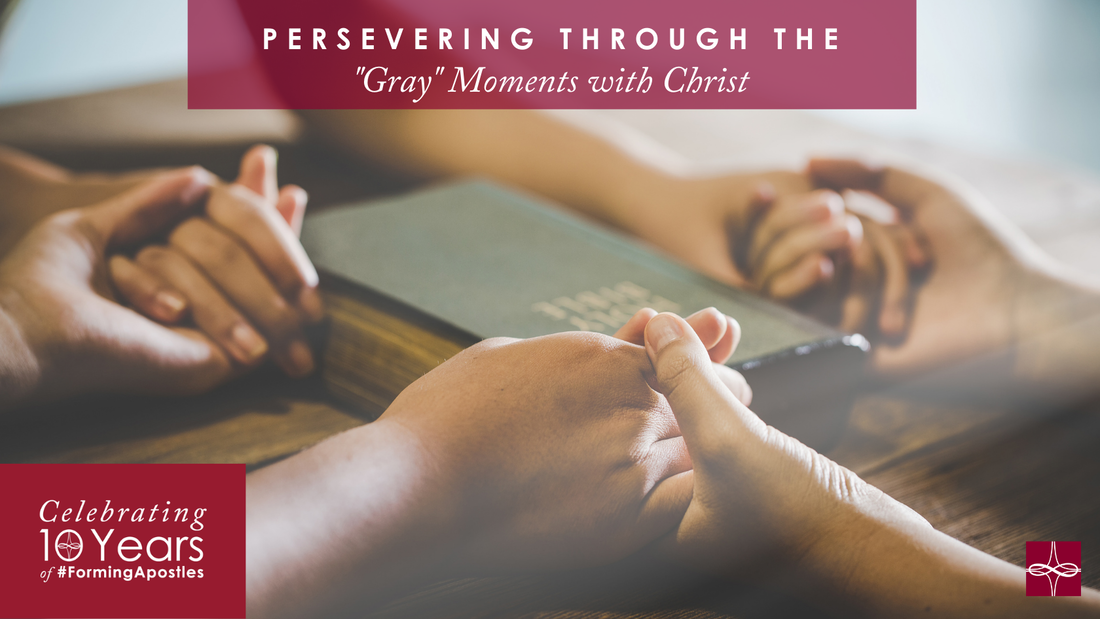





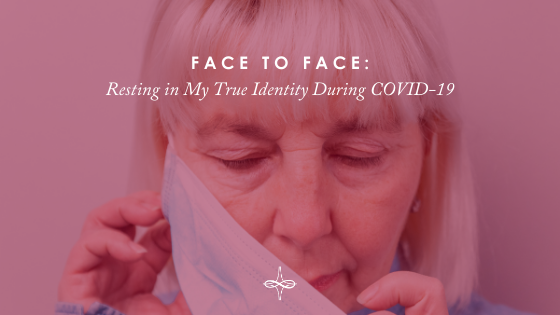

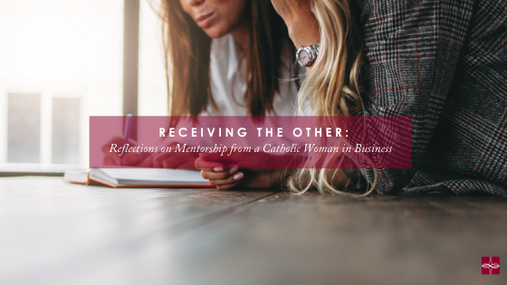


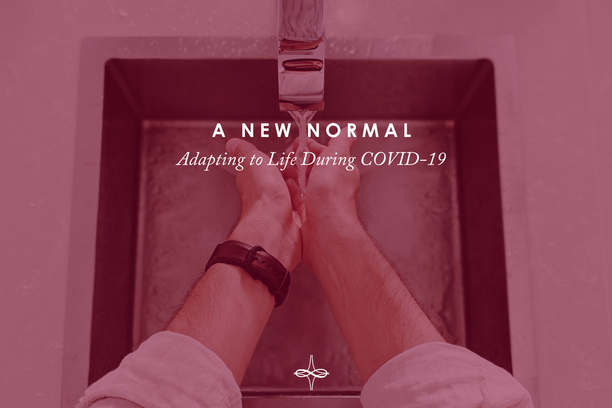


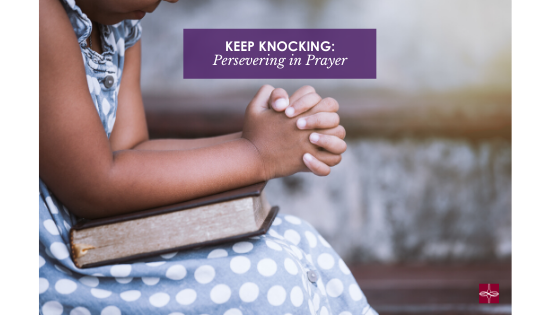


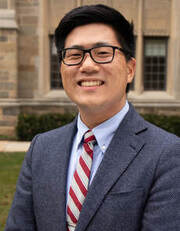
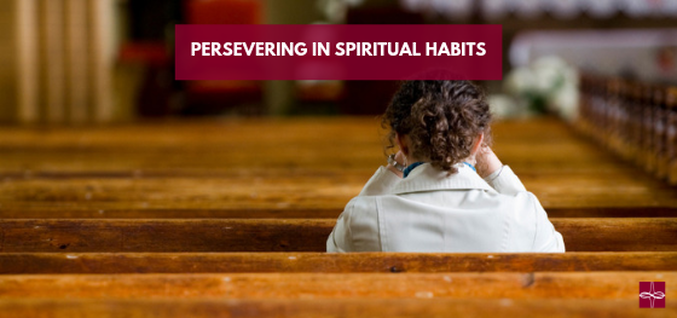





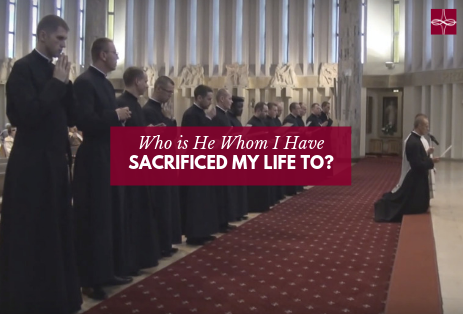

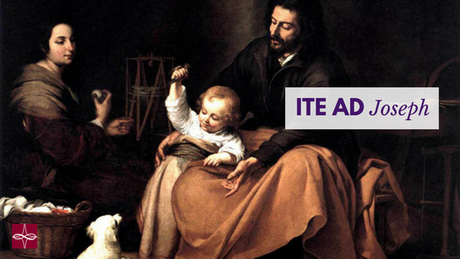

 RSS Feed
RSS Feed